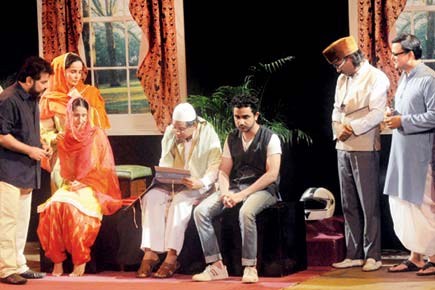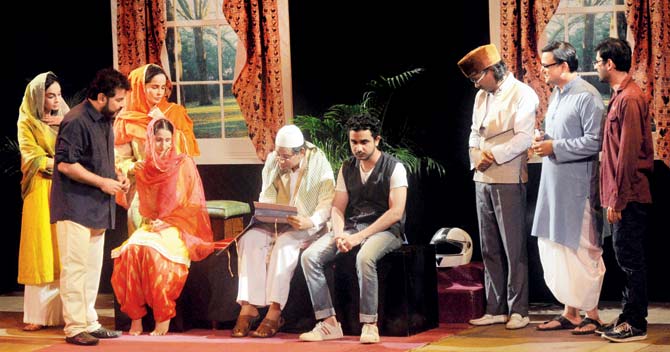Phir Se Shaadi is a laugh riot with its tongue-in-cheek stance on triple talaq that questions the helplessness of women in feudal societies


Actors perform in the theatre production Phir Se Shaadi. Pic/Narendra Dangiya
ADVERTISEMENT
 Humour is the best way to make a bitter pill go down, and this is what writer-director Imran Rasheed has done with his new play Phir Se Shaadi. Without hurting any religious sentiments, he has put some social customs under the lens, and made the audience think about the position of women in feudal societies even as they are laughing uproariously.
Humour is the best way to make a bitter pill go down, and this is what writer-director Imran Rasheed has done with his new play Phir Se Shaadi. Without hurting any religious sentiments, he has put some social customs under the lens, and made the audience think about the position of women in feudal societies even as they are laughing uproariously.
The skill of a director lies in creating an authentic social milieu without going overboard with the sets. With just a few simple props, two painted scrolls, and costumes, Rasheed establishes a North Indian setting. The rest is done by language — colloquialisms, slang and vocal inflections.
The place is urban, judging by the costumes of the young people, but also with a small town mindset, where students and professors have an easy, almost familial, relationship out of the classroom, and even after the youngsters have graduated. Professor Kamaal (Danish Hussain) is one such teacher his former students treat as a friend and confidant.
Aiman (Farrukh Seyer) and Sheeba (Nisha Dhar) have come to the professor, because they want to get married. The hitch is that they were married earlier and got divorced. It is not so easy to remarry; as the Qazi (Mohammad Khaliq) points out, Islam has the system of ‘halala’ under which a divorced couple can marry again only if the woman first marries another man, consummates the marriage and then he agrees to divorce her. This custom was meant to discourage the uttering of the triple talaq by men for frivolous reasons. But it makes women totally powerless in choosing their own fate. In a society that demands chastity from women, this can end up wrecking relationships. When Aiman takes the professor aside, hems, haws and asks, ‘What about sex,’ he is told that love is spiritual, not merely physical.
BR Chopra’s 1982 film, Nikaah was about this custom too, in which the leading lady Nilofer (Salma Agha) is divorced by her piqued husband Wasim (Deepak Parashar). But when she remarries, the husband turns up and wants her back. The second husband Haider (Raj Babbar), whom she loves deeply, decides to sacrifice his love and ‘gift’ her divorce on her birthday so that she can be reunited with her first husband. At which point, she lashes out at both men (in a vitriolic monologue penned by Achla Nagar). “Women are not currency notes to be given away or pieces of furniture to be discarded after use... What’s the difference between you and Wasim?” she demands of Haider. “He used divorce like an insult, you give it as a gift; he treated divorce as a right, you treat it as sacrifice. In both cases the woman suffers.”
Rasheed’s approach is not melodramatic, but absurd — the funniest bit being the hunt for a groom for halala. Professor Kamaal’s Hindu friend Jialal (Yasir Khan), and wife Husna (Rukhsar Kabir Khan) are recruited in the hunt for a malleable groom who will marry and divorce Sheeba on demand, so that she can remarry Aiman. The one guy they find who is willing to go through with it, so that he can make some money to elope with his girlfriend, is caught out just before the wedding ceremony goes through, and his girlfriend refuses to believe that he was not betraying her.
Aiman timidly asks Professor Kamaal if he would help by being the short-term groom, and after his wife tearfully agrees, he marries Sheeba, and then, much to everyone’s surprise and horror, refuses to divorce her, because she makes him feel young. It took Rasheed’s wonderfully witty script and the perfect comic timing of his team of actors to turn a serious social problem into a hilarious farce. For instance, when the wedding takes place — that nobody is happy about — two hijras muscle in and demand money. Brushing aside the currency issue, they pull out a card machine.
There is a bunch of qawwals who comment from the sidelines in song led by a “Nusrat type Khan sahab” (Karan Desai) — it’s a while that a play has used this form of robust music with the wildly clapping accompanists.
Without underlining the sorry condition of the young woman who is passed about like a parcel and is helpless to leave the professor, because only the man can utter the triple talaq and get rid of the wife, Rasheed creates a counterpoint and saviour for the meek Sheeba in the fiery and confident Husna, who weeps a bit and then decides to solve the problem. And how!
Deepa Gahlot is an award-winning film and theatre critic and an arts administrator. She tweets @deepagahlot. Send your feedback to mailbag@mid-day.com
 Subscribe today by clicking the link and stay updated with the latest news!" Click here!
Subscribe today by clicking the link and stay updated with the latest news!" Click here!







